The best Python hosting providers offer optimized environments for deploying and managing Python applications. The top recommended Python hosting service is Hostinger. It provides developers with high-performance hosting, full root access, and fast NVMe storage.
Python hosting is a web hosting service optimized to support websites or applications built with Python technologies. Python is a high-level and versatile programming language known for its readability and extensive library support. Python hosting provides a server environment with Python pre-installed, supporting multiple Python versions and frameworks. Python hosting is suitable for diverse use cases, including developers building custom web apps, data scientists running machine learning models, and businesses needing scalable backend solutions.
There are 3 main types of Python hosting: Python shared hosting, Python VPS (Virtual Private Server) hosting, and Python cloud hosting. Python hosting costs range from RM9 to RM180 per month depending on the type of hosting selected and the resources allocated. Free Python hosting options exist but their limitations make them suitable for small Python apps or testing environments only.
4 popular Python frameworks supported in Python hosting are Flask, Django, web2py, and FastAPI. 4 alternatives to Python hosting are PHP hosting, Node.js hosting, Ruby on Rails hosting, and Java hosting.
Top Python Web Hosting Providers
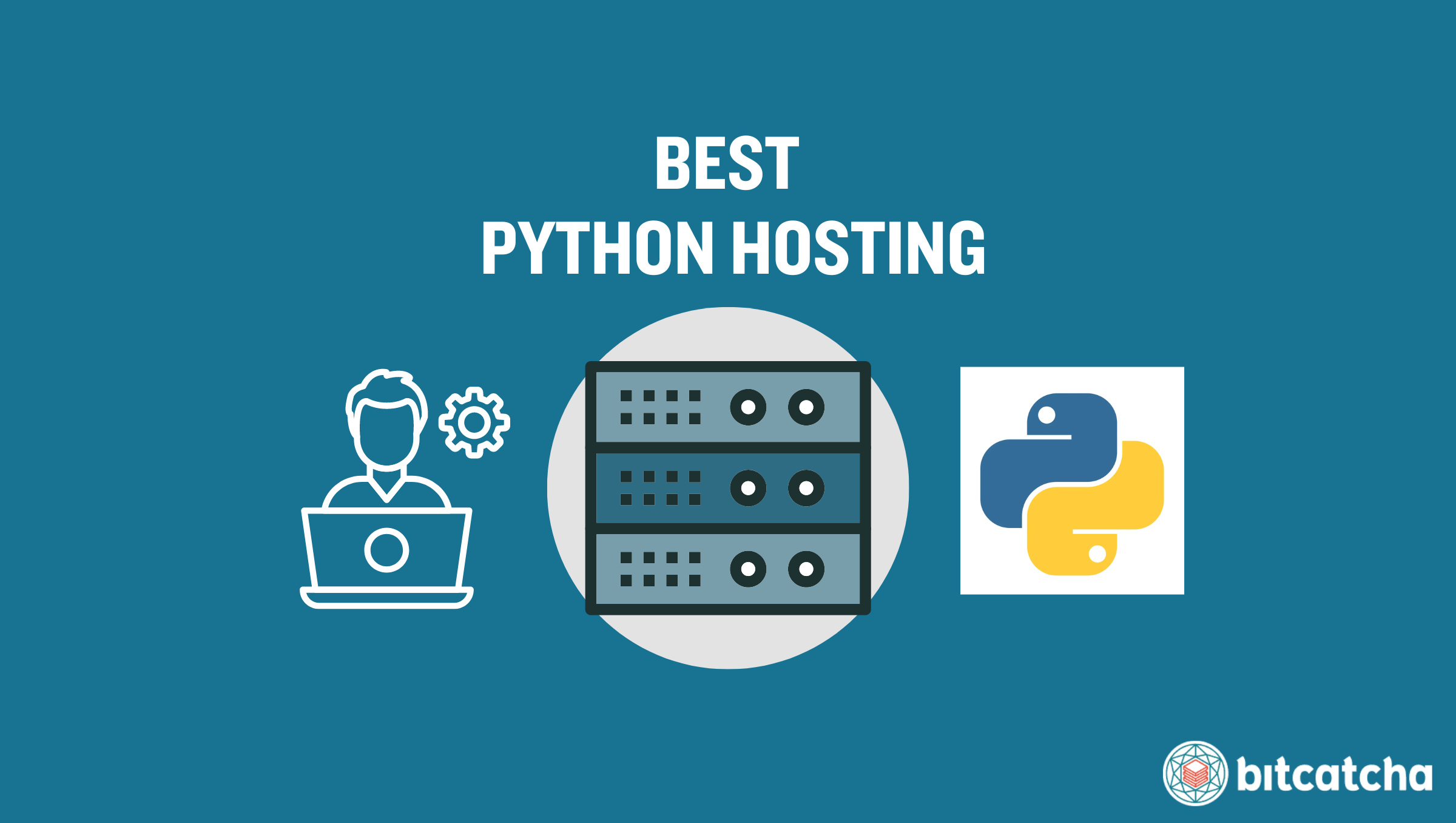
note
The Malaysian prices in this article are calculated using an exchange rate of 1 USD to 4.5 MYR.

1. Hostinger
https://www.hostinger.com/
Hostinger’s KVM 1 VPS plan is perfect for handling demanding Python applications that require significant computational power and memory. This plan includes 1 vCPU core, 4 GB RAM, and 50 GB of high-speed NVMe disk space. The plan also features a generous 4 TB bandwidth, making it ideal for projects with substantial data transfer requirements. Full root access is available for this plan, which allows customers to install and update the latest version of Python.
The inclusion of a dedicated IP and an AI assistant enhances the control and management of the server environment, allowing for precise customization and efficiency. Weekly backups and the ability to create snapshots ensure your data remains safe during upgrades or in the event of data loss.
Further boosting its capabilities are the NVMe SSD storage coupled with AMD EPYC processors, which deliver faster access times and improved data processing speeds. This infrastructure is supported by a 300 Mb/s network. Learn more in our Hostinger analysis.
What are the pros and cons of of Hostinger’s Python hosting?
Pros
- High-performance hardware for demanding Python applications
- Comprehensive server management features including AI Assistant and malware scanner
- Robust security with DDoS protection and configurable firewall
Cons
- Might be over-specified for smaller projects or for beginners

2. TMDHosting
https://www.tmdhosting.com/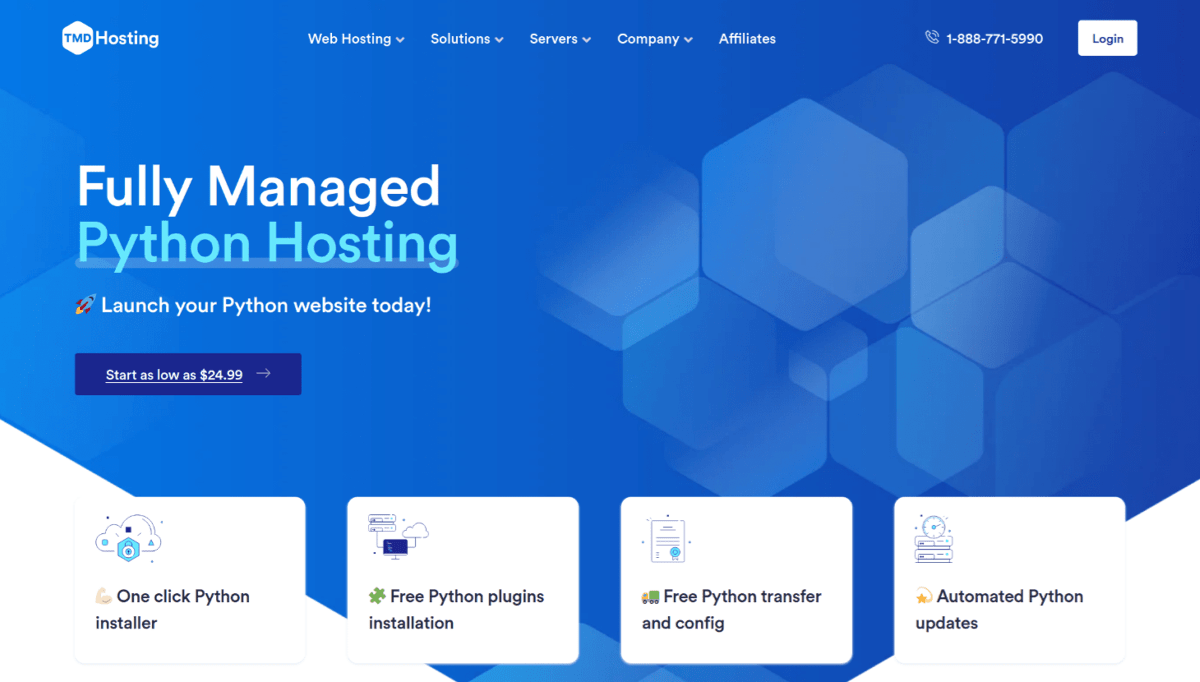
The Starter Linux VPS plan from TMDHosting is ideal for Python developers seeking enhanced performance and greater resource control. This plan comes with 60GB of SSD storage and 2TB of bandwidth, making it perfect for growing Python projects. They’re also a proven fast web host that offer a global network of 6 data centers.
TMDHosting also includes 4 fantastic Python-specific features in these plans to make it more convenient for developers. These are a one-click Python installer, free Python plugins installations, free Python transfer and configuration, and also automated Python updates. The inclusion of cPanel/WHM enhances manageability, allowing for easy configuration and management of the hosting environment.
Security is a top priority with this plan and they also offer advanced firewall systems, and real-time threat detection. You also get 24/7 customer support from a team of experts. Learn more in our TMDHosting analysis.
What are the pros and cons of of TMDHosting Python hosting?
Pros
- Large SSD storage and bandwidth ideal for Python applications
- 1-click Python installer and free Python plugin installations
- Managed VPS services
- Full control with cPanel/WHM and root access
- Enhanced security features and isolation of VPS
Cons
- Higher price point compared to shared hosting
- Requires more technical knowledge to manage effectively

3. A2 Hosting
https://www.a2hosting.com/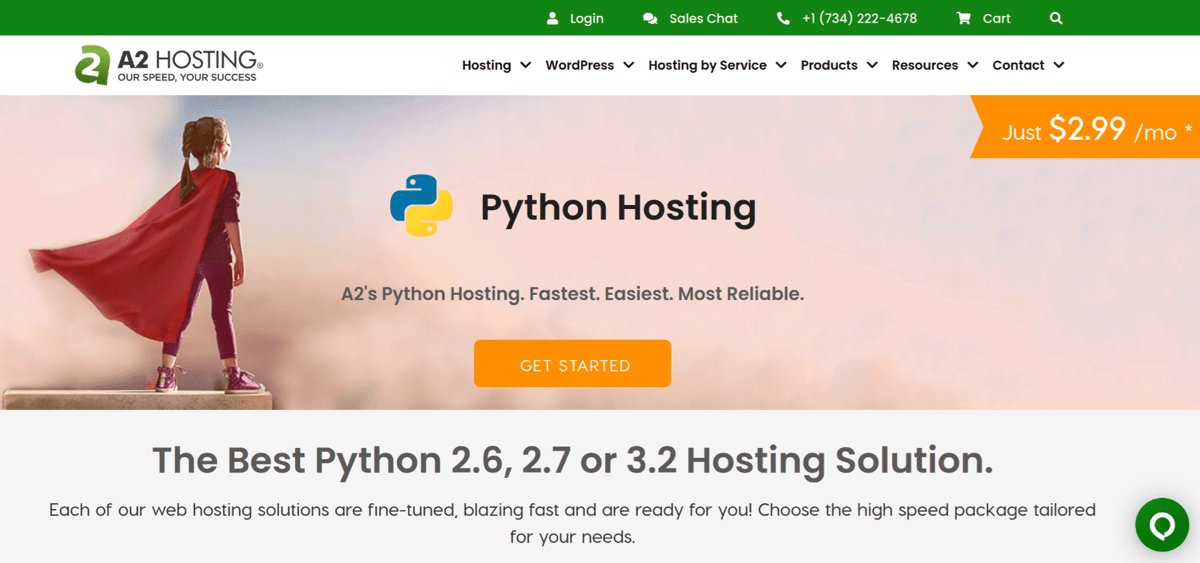
A2 Hosting is a name that stands out with its Python hosting. With its optimized Turbo Servers, the platform guarantees lightning-fast performance for your Python applications. What’s more, their hosting plans already come pre-configured with Python, allowing you to get started quickly without any hassle. Simply choose your desired Python version, whether it’s 2.7, 3.3, or 3.4.
But it doesn’t stop there. A2 Hosting goes the extra mile to ensure the security of your applications and data. They offer advanced security features such as free SSL certificates, robust firewalls, reinforced DDoS protection, and proactive monitoring, so you can rest easy knowing that all your Python projects are well-guarded.
Scalability is another area where A2 Hosting excels. Their hosting plans provide ample resources and the flexibility to seamlessly upgrade as your project grows. So whether you’re starting with a small personal website or working on a large-scale Python web application, A2 Hosting has the scalability and performance you need to thrive.
And when you encounter any technical queries or issues, A2 Hosting’s 24/7/365 Guru Crew support is there to assist you. You can rely on their knowledgeable team to provide prompt and reliable support, so you can enjoy a smooth hosting experience. Head over to our complete A2 Hosting review to learn more!
What are the pros and cons of of A2 Hosting Python hosting?
Pros
- Performance-oriented provider
- Blazing speeds and reliable infrastructure
- Excellent customer support from A2 Hosting’s Guru Crew
- Scalable hosting plans
- Comprehensive security features
Cons
- Turbo servers at additional cost
- More technical expertise may be required

4. UltaHost
https://ultahost.com
UltaHost is an excellent choice for developers seeking versatile Python hosting. It offers robust infrastructure, affordable pricing, and developer-friendly features.
UltaHost ensures seamless compatibility and easy deployment with support for popular Python frameworks like Django, Flask, and Pyramid. Their 1-click deployment feature and SSH/SFTP access make setting up your Python environment effortless, and saves you time and effort.
UltaHost’s hosting plans leverage NVMe SSD storage, DDR5 RAM, and AMD EPYC processors for exceptional speed and performance. These cutting-edge technologies ensure faster execution of Python scripts and better resource management for high-traffic applications. Developers are also able to take advantage of global data center locations for improved website speed and latency reduction.
The plans include built-in BitNinja security, DDoS protection, and automatic backups to safeguard your Python applications and data. With scalable resources, unlimited bandwidth, and instant OS setup, UltaHost provides a reliable hosting environment that grows with your projects. Find out more in our full UltaHost review.
What are the pros and cons of of UltaHost Python hosting?
Pros
- NVMe SSD storage and DDR5 RAM for fast data processing
- Supports popular Python frameworks like Django and Flask
- One-click deployment and instant OS setup for quick configuration
- Comprehensive security features, including DDoS protection and automated backups
- Scalable resources and unlimited bandwidth
Cons
- Free domain only available with annual plans
- Advanced features require technical expertise

5. InMotion Hosting
https://www.inmotionhosting.com/
If you’re in search of a reliable Python hosting service that prioritizes uptime, InMotion Hosting is your ideal choice. They employ advanced technologies, such as SSD/NVMe SSD storage and redundant networking, to ensure maximum uptime for your Python applications.
The platform takes Python hosting to the next level by offering support for the latest Python versions and providing pre-installed Python modules and libraries too. Their shared hosting plans are designed with developers in mind, ensuring a developer-friendly environment.
What also stood out to us was their Hosting Plus package, an innovative shared hosting solution that grants you access to popular frameworks and automation tools. With features like SSH access and Git integration, you have the power to deploy and manage your Python projects with ease, incorporating convenient deployment and version control options. Find out more in our in-depth InMotion Hosting review!
What are the pros and cons of of InMotion Hosting Python hosting?
Pros
- Performance-oriented shared hosting plans
- Competitive pricing for their feature-rich shared hosting plans
- High-grade commercial security
- Developer-friendly provider
Cons
- Data centers are in the US only
- No free domain for the lowest shared hosting plan

6. HostGator
https://www.hostgator.com/
If you’re considering hosting your Python applications, HostGator is a name worth considering. With their user-friendly cPanel interface and robust hosting environment, they offer a seamless experience for Python developers.
The platform provides a range of hosting options, including shared hosting, VPS hosting, and dedicated servers, giving you the flexibility to choose the solution that best suits your project’s requirements. Their competitive-priced plans are easily scalable and affordable too, allowing you to start small and expand as your project grows.
What’s more, HostGator supports the latest versions of Python and offers developer tools to enhance your workflow, ensuring that you have the necessary resources for successful Python hosting.
Setting up and managing your Python applications is also a breeze with HostGator. They provide one-click installations for popular Python frameworks and modules, allowing you to quickly jumpstart your development process and get your applications up and running in no time.
Last but not least, HostGator offers multiple support channels to assist you when you need help. Whether you prefer phone support, live chat, or even reaching out via Twitter, HostGator ensures that you have various avenues to get the support you require. Find out what makes HostGator stand out in our thorough review.
What are the pros and cons of of HostGator Python hosting?
Pros
- Multiple support channels via phone/live chat/Twitter
- Competitive-priced plans are easily scalable and affordable
- Comprehensive security measures
- Unlimited emails for all tiers
Cons
- Data centers are in the US only
- Mixed reviews on customer support

7. IONOS
https://www.ionos.com/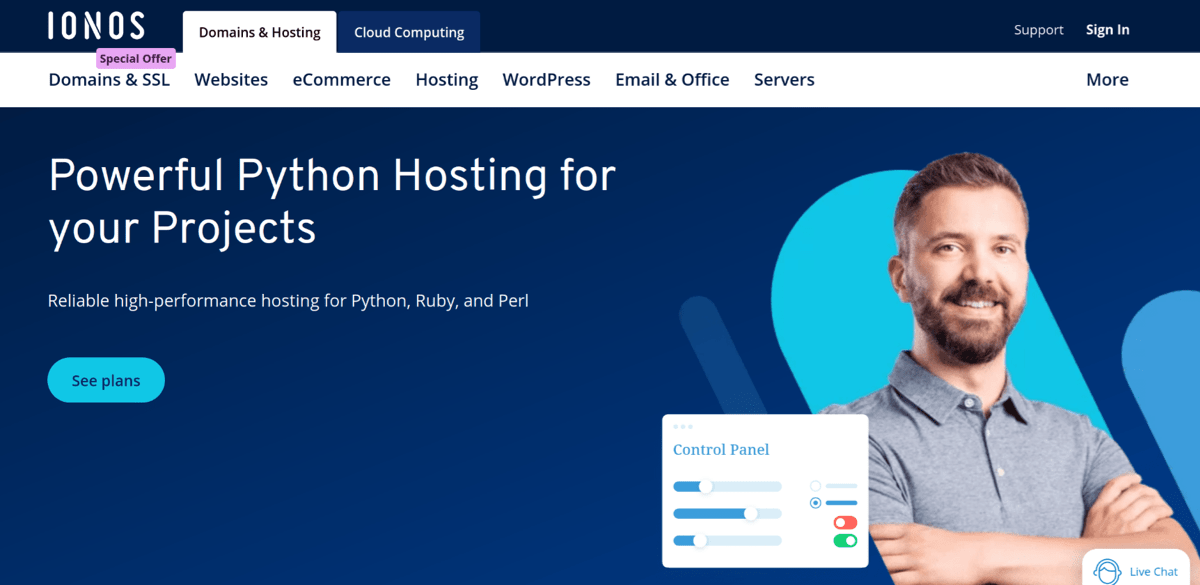
With their powerful infrastructure and extensive features, IONOS (formerly known as 1&1 IONOS) caters to the needs of both beginners and experienced Python developers. Riding on SSD, you can enjoy optimized performance and effortless hosting.
But what truly makes IONOS stand out is their ISO 27001 certified data centers, which adhere to strict security standards and procedures to protect your sensitive information. This certification demonstrates their commitment to maintaining the highest level of security and data privacy.
As an added bonus, IONOS offers a free domain, allowing you to establish a professional online presence with ease. They also provide wildcard SSL certificates, which offer secure encryption for your subdomains under a single certificate, simplifying the management and security of your entire website.
And we also love that they offer email services for all tiers of their hosting plans. This means that you can create professional email addresses associated with your domain, enhancing your communication and brand identity. Find out more in our IONOS review.
What are the pros and cons of of IONOS Python hosting?
Pros
- ISO 27001 certification data centers
- Free domain, wildcard SSL, email for all tiers
- Their Plus plan offers huge value-for-money at $1/month
- Other services available (Domain, SSL, marketing, website builder, and more)
Cons
- Mixed reviews on customer support
- Storage for the lowest plan is limited

8. Heroku
https://www.heroku.com/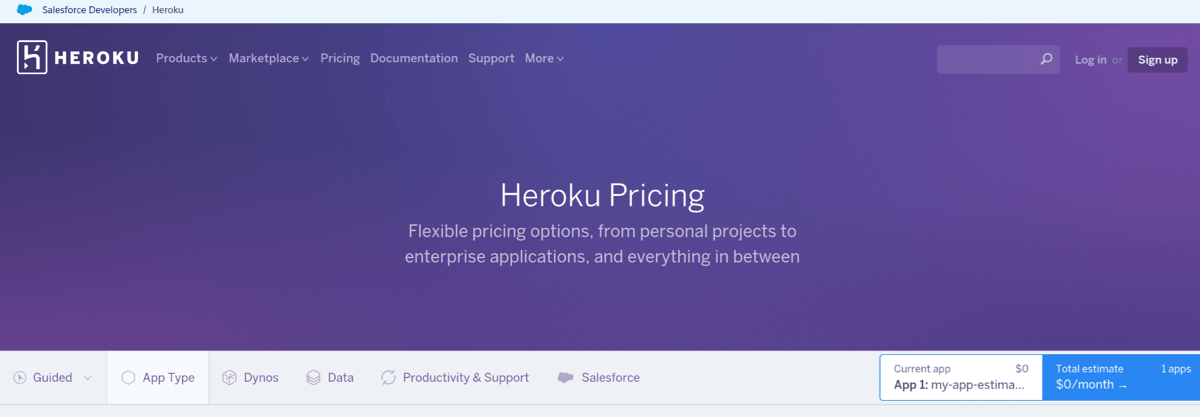
Heroku is a fantastic choice if you’re looking for a cloud-based service to host your Python applications. Known for its simplicity and scalability, the platform allows you to easily deploy and manage your Python projects.
With Heroku, your app runs in a dyno, which is a secure container where you can choose your preferred Python version. You have the flexibility to select the appropriate dyno for your needs, ranging from low-cost options to dedicated dynos designed for high-traffic applications.
Managing your Python app portfolio is pretty much effortless with Heroku. You can use the user-friendly dashboard or the Command-Line-Interface (CLI) to handle your applications effectively.
Additionally, Heroku provides monitoring capabilities, allowing you to track CPU usage, response time, throughput, and memory usage. This enables you to diagnose errors, optimize performance, and determine when to scale your application. Scaling your Python app’s web dynos is as simple as executing a single CLI command or adjusting a slider in the intuitive Heroku Dashboard.
Lastly, Heroku offers a rich selection of add-ons and extensions to help you unlock the full potential of your projects. With automated scaling and seamless Git integration, you can streamline the deployment and management process, freeing up your valuable time and energy. This empowers you to focus on what truly matters – developing your Python applications and maximizing their capabilities. Learn more on the official website of Heroku.
What are the pros and cons of of Heroku Python hosting?
Pros
- Scalable Cloud hosting plans
- Powerful extensions to expand your Python application’s capabilities
- Comprehensive documentation and tutorials
- Multiple framework choices
Cons
- Complicated pricing plans
- Mixed reviews on customer support

9. PythonAnywhere
https://www.pythonanywhere.com/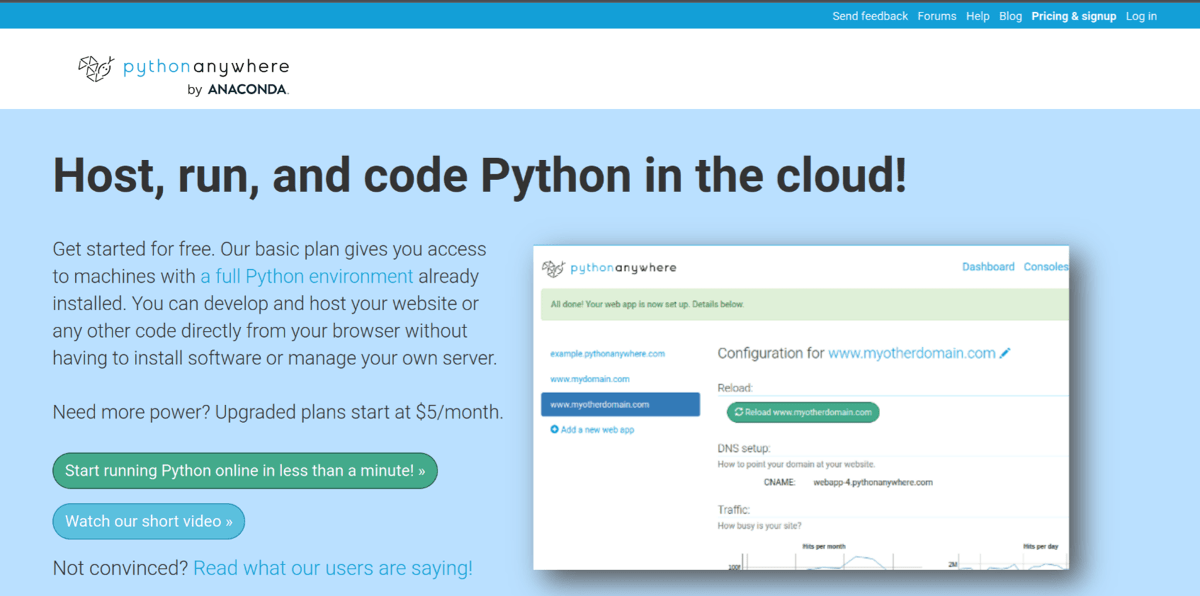
PythonAnywhere is a specialized hosting service tailored for Python developers, making it easy to create and run Python programs from (literally) anywhere. Write your programs in a web-based editor on the go, or run a console session from any web browser to access and control your Python projects.
With PythonAnywhere, you benefit from pre-installed libraries and tools that expedite your development process. Powered by super-powerful servers hosted by Amazon EC2, PythonAnywhere allows you to run simple Python programs without any cost, providing an ideal environment to explore your ideas.
What’s more, its web-based console offers an intuitive interface to manage your files, databases, and scheduled tasks. PythonAnywhere also supports popular web frameworks like Django and Flask, empowering you to build and deploy dynamic web applications with ease. Find out more on PythonAnywhere’s official website!
What are the pros and cons of of PythonAnywhere Python hosting?
Pros
- Python-oriented hosting provider
- A free plan is available for basic Python projects
- Code on the go
- Easy scaling plans
- Pre-configured with many libraries
Cons
- Limited storage for the lowest-paid plan
- The free plan offers low CPU/bandwidth
What Is Python Hosting?
Python hosting is a type of web hosting service optimized for the deployment of Python-based applications. It offers a pre-configured server environment where Python is pre-installed and where multiple Python versions are typically supported to ensure compatibility with your particular project.
Python hosting is a very popular subset of developer hosting that prioritizes compatibility with Python and thus helping developers more effectively work with its frameworks and scripts. Python hosting works seamlessly with Python web frameworks like Django and Flask. It also usually offers features crucial for development workflows. This includes version control systems like Git, SSH access for remote management, and support for databases commonly used with Python such as PostgreSQL or MySQL.
What Is Python?
Python is a high-level, interpreted programming language prized for its power and easy readability due to its use of English keywords rather than punctuation. It was created by Guido van Rossum and first released in 1991. Python supports multiple programming paradigms including object-oriented and functional programming. Its large standard library and active community make it particularly versatile.
Who Should Use Python Hosting?
You should use Python hosting if your website or web application is built with Python technologies. Python hosting powers a diverse range of personal and business websites because it offers many benefits in the field of website building. In fact, Python powers 1.3% of all websites with known server-side programming languages according to W3Techs. Note that building a website from scratch with Python requires more technical knowledge compared to using a pre-built CMS like WordPress but it allows for greater customization and control over your site’s functionality.
Python hosting is also commonly used by data scientists and engineers who need to run Python scripts for automation, data processing, or machine learning.
Can I Use Python Hosting for a Personal Blog?
Yes, you can use Python hosting for a personal blog. Python is fairly easy to learn and use which makes it a viable option for those looking to create custom personal websites. Python frameworks like Django provide built-in admin interfaces and content management features that can be useful for blogging. Python hosting takes your custom-built blog online and makes it accessible to your audience.
Can I Use Python Hosting for a Business Website?
Yes, you can use Python hosting for a business website. This type of hosting suits businesses looking to build complex or custom applications. Python developers are also relatively easy to source and hire thanks to the language’s popularity and widespread use in web development.
Can I Use Python Hosting for an eCommerce Website?
Yes, you can use Python hosting for an eCommerce website. Python has purpose-built libraries and frameworks that support eCommerce functionality, including shopping carts, payment gateways, and inventory management. One example is Django Oscar which is an open-source eCommerce framework for Django. Python also integrates well with various third-party services, such as Stripe for payment processing or Shopify API for inventory management. Python hosting pairs well with these tools to manage an online store.
What Are My Options for Python Hosting?
You have 3 options for Python hosting: shared, VPS, and cloud hosting. Python shared hosting is a type of hosting where multiple websites are hosted on the same physical server and share resources like CPU, RAM, and storage. Keep in mind that Python support is limited in shared hosting and often locked to one Python version. This provides developers with less control over server configurations. This option is best for small, simple use cases or beginners with minimal resource needs.
Python VPS (Virtual Private Server) hosting is a type of hosting where you get a partitioned section of a physical server along with dedicated resources. VPS hosting offers more flexibility and isolation from other users as you’re able to install different Python versions and customize the server environment. This is ideal for Python developers who need more control and power.
Python cloud hosting is a type of hosting where your app or site runs on a network of virtual servers in the cloud. This setup allows for dynamic resource scaling. Python hosting in the cloud lets you install multiple versions and adjust resources based on traffic or workload. This option is perfect for developers prioritizing scalability and high uptime.
Who Offers Python VPS?
Hostinger, HostGator, A2 Hosting, and InMotion Hosting are 4 web hosts that offer Python VPS. Hostinger offers Python VPS hosting with full root access and high-performance NVMe storage. HostGator provides scalable Python VPS plans with flexible resources for growing projects. A2 Hosting offers optimized Turbo Servers for fast, high-performance Python hosting. InMotion Hosting delivers Python VPS with SSD storage and developer tools like SSH access.
Who Offers Python Cloud Hosting?
TMDHosting and Heroku are 2 web hosts that offer Python cloud hosting. TMDHosting offers scalable cloud hosting with support for Python frameworks like Django and Flask. Heroku provides flexible cloud hosting with automatic scaling and easy deployment for Python applications.
What Is the Cost of Python Hosting?
The cost of Python hosting ranges from RM9 to RM180 per month depending on the type of hosting and the web hosting brand. Python shared hosting is the most affordable. Python VPS and cloud hosting offer more control and scalability at higher prices. Python managed hosting plans are also on the more expensive end of the price range since these services offload most of the responsibilities of server management and maintenance to the web host.
Are There Free Python Hosting?
Yes, there are free Python hosting services available from providers like PythonAnywhere and HelioHost. Keep in mind that these free plans come with limitations such as subdomain-only access, no SSH, limited CPU allowance, bandwidth, and storage. We don’t recommend free Python hosting for large projects but they are sufficient for running small Python apps or testing environments.
What Frameworks Are Supported in Python Hosting?
4 common frameworks supported by Python hosting are Flask, Django, web2py and FastAPI. A Python framework refers to a collection of modules and tools built with Python that simplify web application development. These frameworks provide pre-written Python code for common web development tasks such as URL routing, database operations, and template rendering. Both Flask and Django leverage Python’s syntax and features and offer Pythonic ways to handle web requests, manage database models, and implement security measures.
It’s important to pair each Python framework with compatible web hosting, whether it’s general Python hosting or specialized subsets such as Flask hosting or Django hosting. This ensures full compatibility and allows developers to untap the full potential of that particular framework.
What Is Flask Hosting?
Flask hosting refers to web hosting services optimized for the lightweight Flask micro-framework. Flask is minimalistic and provides developers with control over routing, templating, and other core components, without enforcing strict patterns. Hosting for Flask applications focuses on flexibility, offering support for Python installation, virtual environments, and web server configurations like Nginx or Apache. Flask apps are commonly deployed through WSGI servers such as Gunicorn. This ensures easy deployment and scalability for simple to moderately complex applications.
What Is Django Hosting?
Django hosting is designed to run applications built with the Django framework. Django emphasizes rapid development and a clean, organized structure. Unlike Flask, it comes with built-in features like an ORM, admin panel, and user authentication. Hosting providers offer pre-configured environments, including Python, web servers like Nginx or Apache, and databases such as PostgreSQL or MySQL. Django hosting supports essential features like database migrations, static file handling, and WSGI server integration (e.g., Gunicorn).
What Is the Alternative to Python Hosting?
There are 4 main alternatives to Python hosting: PHP hosting, Node.js hosting, Ruby on Rails hosting, and Java hosting. PHP hosting is designed for PHP-based applications, and is often used with frameworks like Laravel or CMS platforms like WordPress. In contrast to Python hosting, PHP hosting emphasizes server-side scripting and is commonly used for web content management. Node.js hosting is ideal for JavaScript-based applications that require event-driven, non-blocking servers. Unlike Python hosting, which supports synchronous and asynchronous tasks, Node.js hosting is optimized for building real-time applications like chat platforms and online games.
Ruby on Rails hosting supports the Ruby on Rails web development framework. Ruby hosting offers similar features to Python hosting but is typically used for rapid application development in startups or small-scale web applications. Java hosting supports apps built with Java frameworks. Python hosting caters to apps of all sizes while Java hosting is a popular choice for resource-intensive and enterprise-level projects.
Which Is the Best Python Hosting Provider?
The best Python hosting provider delivers the ideal environment for deploying Python applications. They offer flexibility, performance, and essential tools like Python version control and virtual environments. Other important features include support for major Python frameworks like Django and Flask and scalability. All the Python hosting providers we’ve reviewed meet these standards. Our top recommendation is Hostinger for its high-performance VPS plans, full root access, and affordable pricing.
| Specifications | Hostinger | TMDHosting | A2 Hosting | Ultahost | InMotion Hosting | HostGator | IONOS | Heroku | PythonAnywhere |
|---|---|---|---|---|---|---|---|---|---|
| Plan name | KVM 1 | Starter | Ignite | VPS Basic | Core | Hatchling Plan | VPS Linux XS | Essential 0 | Hacker |
| Storage | 50 GB | 60 GB | 10 GB | 30 GB | 100 GB | 10 GB | 10 GB | 1 GB | 1 GB |
| Bandwidth | 4 TB | 2 TB | Unmeterd | Unlimited | Unlimited | Unmetered | 1 TB | Limited | 1GB/month |
| Number of website | Unlimited | 20 | 1 | 1 | 2 | 10 | Unlimited | Unlimited | 1 |
| Uptime guarantee | 99.90% | 99.90% | 99.90% | 99.90% | 99.99% | 99.90% | 99.90% | Always ON | 99.90% |
| Free domain name | No | Yes | Yes | Yes | Yes | Yes | No | No | No |
| Free ssl | Yes | Yes | Yes | Yes | Yes | Yes | Yes | Yes | Yes |
| Free backup | Yes | Yes | Yes | Yes | Yes | Yes | Yes | No | No (Manual) |
| CPU core | 1 | 2 | 1 | 1 | 1 | 1 | 1 | 1 | 1 |
| RAM | 4 GB | 2 GB | 1 GB | 1 GB | 1 GB | 2 GB | 1 GB | 512 MB | 512 MB |
| Root access | Yes | Yes | Yes | Yes | Yes | Yes | Yes | No | No |
| SSH | Yes | Yes | Yes | Yes | Yes | Yes | Yes | Yes | Yes |
| Price/mo | RM22.50 | RM180 | RM9 | RM21.60 | RM10.30 | RM17 | RM9 | RM22.50 | RM22.50 |
| See all features |
